2018牛津译林版高中英语高考英语一轮复习全套经典句型教案
- 格式:doc
- 大小:3.23 MB
- 文档页数:117

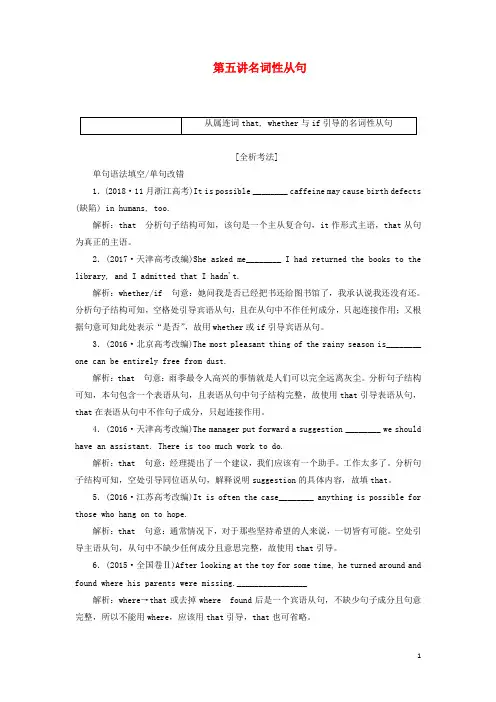
第五讲名词性从句[全析考法]单句语法填空/单句改错1.(2018·11月浙江高考)It is possible ________ caffeine may cause birth defects (缺陷) in humans, too.解析:that 分析句子结构可知,该句是一个主从复合句,it作形式主语,that从句为真正的主语。
2.(2017·天津高考改编)She asked me________ I had returned the books to the library, and I admitted that I hadn't.解析:whether/if 句意:她问我是否已经把书还给图书馆了,我承认说我还没有还。
分析句子结构可知,空格处引导宾语从句,且在从句中不作任何成分,只起连接作用;又根据句意可知此处表示“是否”,故用whether或if引导宾语从句。
3.(2016·北京高考改编)The most pleasant thing of the rainy season is________ one can be entirely free from dust.解析:that 句意:雨季最令人高兴的事情就是人们可以完全远离灰尘。
分析句子结构可知,本句包含一个表语从句,且表语从句中句子结构完整,故使用that引导表语从句,that在表语从句中不作句子成分,只起连接作用。
4.(2016·天津高考改编)The manager put forward a suggestion ________ we should have an assistant. There is too much work to do.解析:that 句意:经理提出了一个建议,我们应该有一个助手。
工作太多了。
分析句子结构可知,空处引导同位语从句,解释说明suggestion的具体内容,故填that。
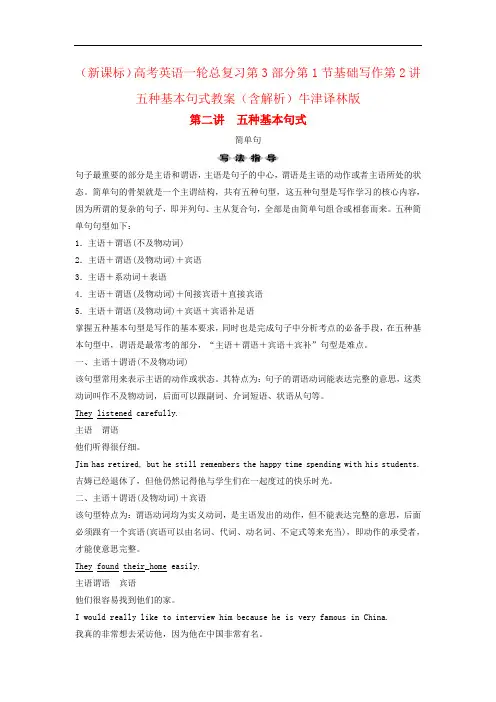
(新课标)高考英语一轮总复习第3部分第1节基础写作第2讲五种基本句式教案(含解析)牛津译林版第二讲五种基本句式简单句句子最重要的部分是主语和谓语,主语是句子的中心,谓语是主语的动作或者主语所处的状态。
简单句的骨架就是一个主谓结构,共有五种句型,这五种句型是写作学习的核心内容,因为所谓的复杂的句子,即并列句、主从复合句,全部是由简单句组合或相套而来。
五种简单句句型如下:1.主语+谓语(不及物动词)2.主语+谓语(及物动词)+宾语3.主语+系动词+表语4.主语+谓语(及物动词)+间接宾语+直接宾语5.主语+谓语(及物动词)+宾语+宾语补足语掌握五种基本句型是写作的基本要求,同时也是完成句子中分析考点的必备手段,在五种基本句型中,谓语是最常考的部分,“主语+谓语+宾语+宾补”句型是难点。
一、主语+谓语(不及物动词)该句型常用来表示主语的动作或状态。
其特点为:句子的谓语动词能表达完整的意思,这类动词叫作不及物动词,后面可以跟副词、介词短语、状语从句等。
They listened carefully.主语谓语他们听得很仔细。
Jim has retired, but he still remembers the happy time spending with his students. 吉姆已经退休了,但他仍然记得他与学生们在一起度过的快乐时光。
二、主语+谓语(及物动词)+宾语该句型特点为:谓语动词均为实义动词,是主语发出的动作,但不能表达完整的意思,后面必须跟有一个宾语(宾语可以由名词、代词、动名词、不定式等来充当),即动作的承受者,才能使意思完整。
They found their_home easily.主语谓语宾语他们很容易找到他们的家。
I would really like to interview him because he is very famous in China.我真的非常想去采访他,因为他在中国非常有名。

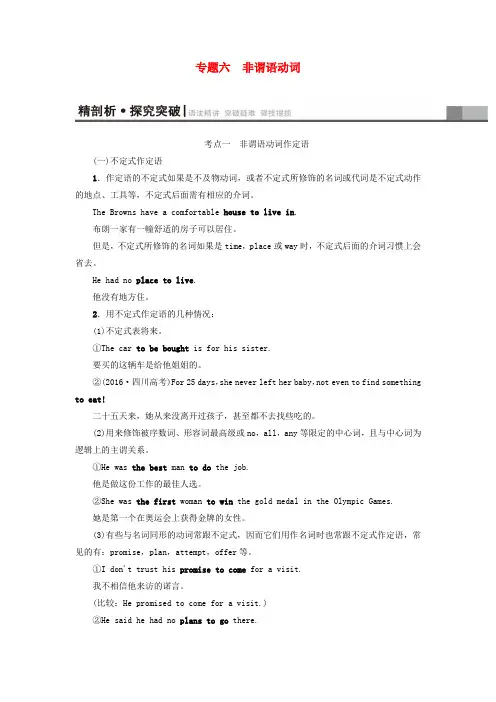
专题六非谓语动词考点一非谓语动词作定语(一)不定式作定语1.作定语的不定式如果是不及物动词,或者不定式所修饰的名词或代词是不定式动作的地点、工具等,不定式后面需有相应的介词。
The Browns have a comfortable house to live in.布朗一家有一幢舒适的房子可以居住。
但是,不定式所修饰的名词如果是time,place或way时,不定式后面的介词习惯上会省去。
He had no place to live.他没有地方住。
2.用不定式作定语的几种情况:(1)不定式表将来。
①The car to be bought is for his sister.要买的这辆车是给他姐姐的。
②(2016·四川高考)For 25 days,she never left her baby,not even to find something to eat!二十五天来,她从来没离开过孩子,甚至都不去找些吃的。
(2)用来修饰被序数词、形容词最高级或no,all,any等限定的中心词,且与中心词为逻辑上的主谓关系。
①He was the best man to do the job.他是做这份工作的最佳人选。
②She was the first woman to win the gold medal in the Olympic Games.她是第一个在奥运会上获得金牌的女性。
(3)有些与名词同形的动词常跟不定式,因而它们用作名词时也常跟不定式作定语,常见的有:promise,plan,attempt,offer等。
①I don't trust his promise to come for a visit.我不相信他来访的诺言。
(比较:He promised to come for a visit.)②He said he had no plans to go there.他说他没有要去那里的计划。
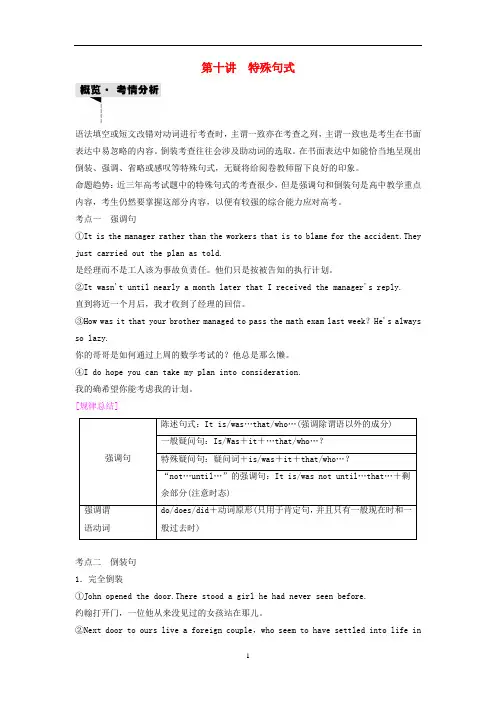
第十讲特殊句式语法填空或短文改错对动词进行考查时,主谓一致亦在考查之列,主谓一致也是考生在书面表达中易忽略的内容。
倒装考查往往会涉及助动词的选取。
在书面表达中如能恰当地呈现出倒装、强调、省略或感叹等特殊句式,无疑将给阅卷教师留下良好的印象。
命题趋势:近三年高考试题中的特殊句式的考查很少,但是强调句和倒装句是高中教学重点内容,考生仍然要掌握这部分内容,以便有较强的综合能力应对高考。
考点一强调句①It i s the manager rather than the workers that is to blame for the accident.They just carried out the plan as told.是经理而不是工人该为事故负责任。
他们只是按被告知的执行计划。
②It wasn't until nearly a month later that I received the manager's reply.直到将近一个月后,我才收到了经理的回信。
③How was it that your brother managed to pass the math exam last week?He's always so lazy.你的哥哥是如何通过上周的数学考试的?他总是那么懒。
④I do hope you can take my plan into consideration.我的确希望你能考虑我的计划。
[规律总结]强调句陈述句式:It is/was…that/who…(强调除谓语以外的成分)一般疑问句:Is/Was+it+…that/who…?特殊疑问句:疑问词+is/was+it+that/who…?“not…until…”的强调句:It is/was not until…that…+剩余部分(注意时态)强调谓语动词do/does/did+动词原形(只用于肯定句,并且只有一般现在时和一般过去时)考点二倒装句1.完全倒装①John opened the door.There stood a girl he had never seen before.约翰打开门,一位他从来没见过的女孩站在那儿。
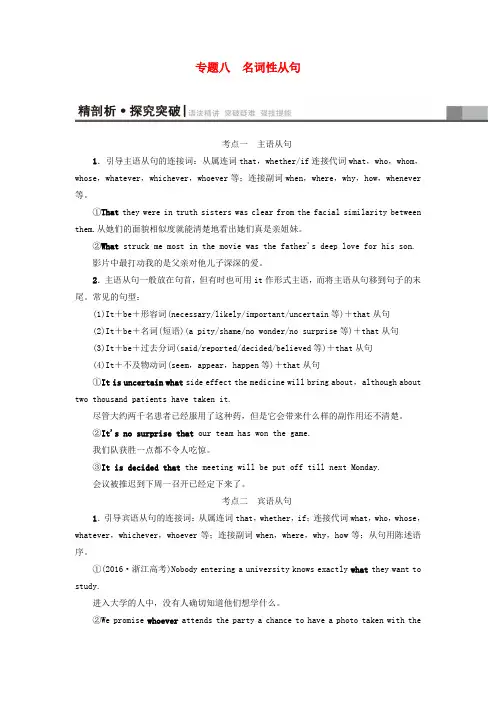
专题八名词性从句考点一主语从句1.引导主语从句的连接词:从属连词that,whether/if连接代词what,who,whom,whose,whatever,whichever,whoever等;连接副词when,where,why,how,whenever 等。
①That they were in truth sisters was clear from the facial similarity between them.从她们的面貌相似度就能清楚地看出她们真是亲姐妹。
②What struck me most in the movie was the father's deep love for his son.影片中最打动我的是父亲对他儿子深深的爱。
2.主语从句一般放在句首,但有时也可用it作形式主语,而将主语从句移到句子的末尾。
常见的句型:(1)It+be+形容词(necessary/likely/important/uncertain等)+that从句(2)It+be+名词(短语)(a pity/shame/no wonder/no surprise等)+that从句(3)It+be+过去分词(said/reported/decided/believed等)+that从句(4)It+不及物动词(seem,appear,happen等)+that从句①It is uncertain what side effect the medicine will bring about,although about two thousand patients have taken it.尽管大约两千名患者已经服用了这种药,但是它会带来什么样的副作用还不清楚。
②It's no surprise that our team has won the game.我们队获胜一点都不令人吃惊。
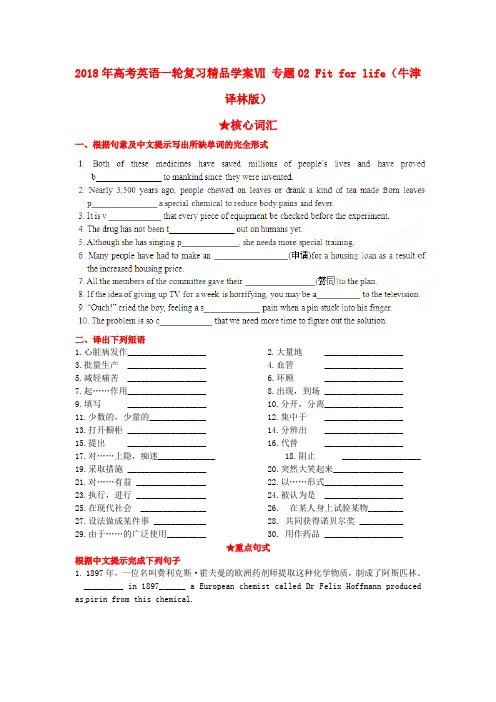
2018年高考英语一轮复习精品学案Ⅶ专题02 Fit for life(牛津译林版)★核心词汇一、根据句意及中文提示写出所缺单词的完全形式二、译出下列短语1.心脏病发作__________________2.大量地 __________________3.批量生产 __________________4.血管 __________________5.减轻痛苦__________________6.环顾 __________________7.起……作用__________________ 8.出现,到场 __________________9.填写 __________________ 10.分开,分离__________________ 11.少数的,少量的_____________ 12.集中于 __________________ 13.打开橱柜 __________________ 14.分辨出 __________________ 15.提出 __________________ 16.代替 __________________ 17.对……上隐,痴迷_____________ 18.阻止 __________________ 19.采取措施 __________________ 20.突然大笑起来________________ 21.对……有益 ________________ 22.以……形式__________________ 23.执行,进行 ________________ 24.被认为是 __________________ 25.在现代社会 _______________ 26. 在某人身上试验某物________ 27.设法做成某件事 ____________ 28. 共同获得诺贝尔奖 __________ 29.由于……的广泛使用_________ 30. 用作药品 __________________★重点句式根据中文提示完成下列句子1. 1897年,一位名叫费利克斯·霍夫曼的欧洲药剂师提取这种化学物质,制成了阿斯匹林。
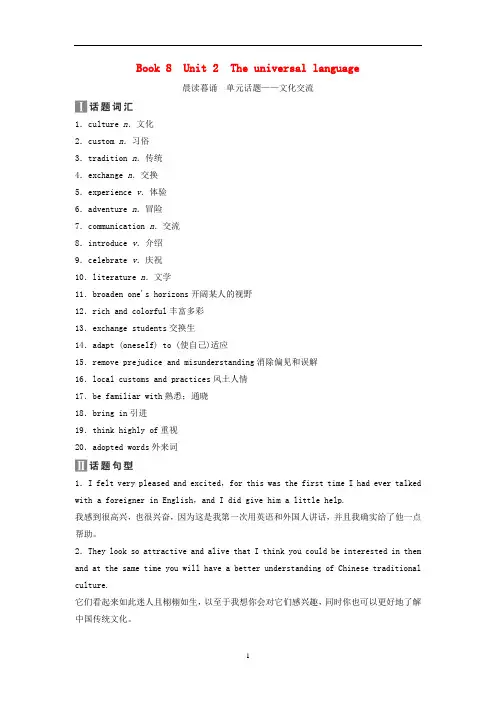
Book 8 Unit 2 The universal language晨读暮诵单元话题——文化交流1.culture n.文化2.custom n.习俗3.tradition n.传统4.exchange n.交换5.experience v.体验6.adventure n.冒险7.communication n.交流8.introduce v.介绍9.celebrate v.庆祝10.literature n.文学11.broaden one's horizons开阔某人的视野12.rich and colorful丰富多彩13.exchange students交换生14.adapt (oneself) to (使自己)适应15.remove prejudice and misunderstanding消除偏见和误解16.local customs and practices风土人情17.be familiar with熟悉;通晓18.bring in引进19.think highly of重视20.adopted words外来词1.I felt very pleased and excited,for this was the first time I had ever talked with a foreigner in English,and I did give him a little help.我感到很高兴,也很兴奋,因为这是我第一次用英语和外国人讲话,并且我确实给了他一点帮助。
2.They look so attractive and alive that I think you could be interested in them and at the same time you will have a better understanding of Chinese traditional culture.它们看起来如此迷人且栩栩如生,以至于我想你会对它们感兴趣,同时你也可以更好地了解中国传统文化。
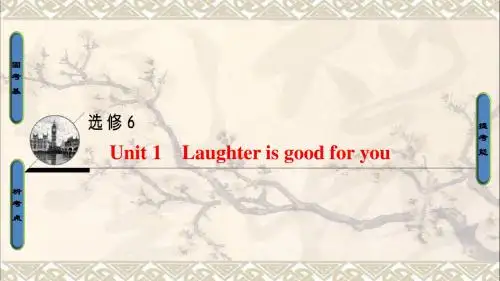
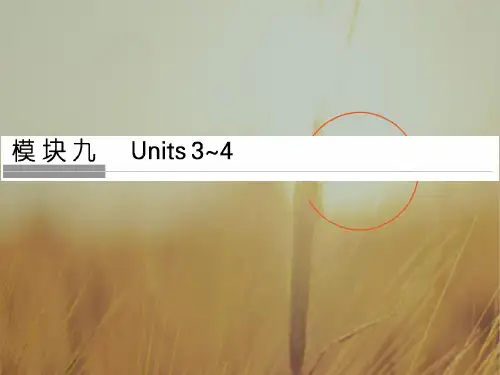
第五课时特殊句式[针对训练]1.(2014·大纲卷)________ the nurses want a pay increase,they want reduced hours as well.A.Not do only B.Do not onlyC.Only not do D.Not only do答案 D [句意:护士们不仅要求提高工资,还要求缩短工作时间。
not only在句首引起句子时,该句用部分倒装,其结构为not only do/will/can etc.,因此D项正确。
] 2.(2014·四川高考)Was it because Jack came late for school________ Mr.Smith got angry?A.why B.who C.where D.that答案 D [强调结构为:It is/was+被强调部分+that+剩余部分。
强调句的判断方法是将It is/was与that去掉,看剩余句子成分是否完整。
经判断,“Because Jack came late for school,Mr.Smith got angry.”句子成分完整,因此可以断定本句是强调句,空格处应用that。
由“Was it...?”可知本句为强调句型的一般疑问形式。
]3.(2014·湖南高考)Children,when ________by their parents,are allowed to enter the stadium.A.to be accompanied B.to accompanyC.accompanying D.accompanied答案 D [when引导时间状语从句,逻辑主语是题干的主语children,把该时间状语从句补充完整为when children are accompanied by their parents。
句子由各个组成部分构成,这些组成部分叫作句子的成分。
句子的成分可分为主语、谓语、表语、宾语、定语、状语、补语等。
弄清句子成分有利于在短文写作中写出正确的句子,有利于在完成句子题型中对考点的判断,有利于在阅读中对长句的理解。
一、主语主语是句子的主体,是句子所要说明的人或事物,表示句子描述的是谁或什么。
主语通常由名词、代词、数词、名词化的形容词、动词不定式、动名词或从句等充当。
I was, nevertheless, talked into going on another funfilled holiday in the wilderness.尽管如此,我还是被说服参加了另一个充满趣味的野外假期。
(代词I作主语)It is important to speak English fluently.流畅地说英语很重要。
(不定式作主语,it为形式主语)注意从句、不定式或动名词作主语时,为避免头重脚轻,往往用形式主语it来替代。
二、谓语英语中动词一共分为四类:实义动词、连系动词、情态动词和助动词,实义动词又分为及物动词和不及物动词。
实义动词可以单独作谓语,其他种类的动词都不能单独作谓语,连系动词需要和表语构成谓语;情态动词和助动词需要和实义动词或连系动词一起构成谓语。
The earthquake happened in 2018.地震发生在2018年。
(实义动词作谓语)The cake smells good.蛋糕闻起来很好。
(连系动词+表语作谓语)You should drink more water when you have a cold.感冒时,你应该多喝水。
(情态动词+实义动词作谓语)He has slept for 20 hours.他已经睡了20个小时了。
(助动词+实义动词作谓语)三、表语表语的功能是表述主语的特征、状态、身份等,位于系动词之后,与之构成系表结构。
可以用作表语的有:名词、代词、数词、形容词、副词、不定式、动名词、分词、介词短语和从句等。
三、代词对应学生用书p162在空白处填入1个适当的单词或括号内单词的正确形式。
1.(2018·浙江卷)Onecupofcoffeeinthelateafternoonoreveningwillcause________(they) tostayawakealmostmostnight.2.(2018·浙江卷)ManywesternerswhocometoChinacookmuchlessthanintheirowncountriesoncetheyreali zehowcheap________canbetoeatout.3.(2018·全国卷Ⅰ)Ifyouaretimepoor, youneedrunforonlyhalfthetimetogetthesamebenefitsasothersports, soperhapsweshouldallgive________atry.4.(2018·全国卷Ⅲ)WhenthegorillasandIfrightenedeachother, Iwasjustgladtofind________(they) alive.5.(2017·全国卷Ⅲ)Thisp ictureoftenbringsbacktomemanyhappymemoriesof________(I) highschooldays.[答案与解析]1.them。
考查代词。
分析句子结构可知,空处做宾语,故用they的宾格形式。
2.it。
考查代词。
此处it做形式主语,真正的主语是toeatout。
3.it/running。
giveitatry为固定搭配,意为“试一试”。
it代指running。
4.them。
这里用them代指上文的thegorillas。
5.my。
根据前半句bringsbacktome可知,此处指我的高中时光,形容词性物主代词修饰后面的名词短语highschooldays。
2018牛津译林版高中英语高考英语一轮复习全套经典句型教案2018(江苏)高考英语一轮复习教案:1.1(b)经典句型一、高考能力提升练习【一】阅读理解阅读下列短文,从每题所给的四个选项(A、B、C、D)中,选出最佳选项。
Coffee is one of the most popular drinks throughout the world today. In fact, according to some estimates, over 30% of all adults in the world drink coffee at least once a day on the average. Coffee contains a kind of drug called caffeine. Caffeine is a chemical that stimulates (刺激) the nerves of the body. Drinking coffee tends to make people a little bit more awake―at least for a short time―because of this stimulating effect on the nervous system. A cup of coffee has, on the average, about 3% caffeine in it.One story of the discovery of the coffee plant relates to this effect of caffeine. According to the story, coffee was discovered in East Africa. The story says that coffee was first found by a goat farmer named Kaldi. This was about the year 850. Kaldi was leading his animals through the mountains and the goats were stopping repeatedly to eat the plants near the path. Suddenly, some of the goats started jumping up and down in a very strange way. Kaldi figured out that the goats were acting this way because of the plants they were eating. Kaldi himself tried eating some of the green beans (豆荚) that the goats had been eating. He, too, felt the stimulating effect of the beans. Kaldi wanted to prove what had happened, so he picked some of the beans and took them back to the village, where he told his story.The green bean got the name "Kaffa" and later "coffee" because the beans were discovered in a place called Kaffa in Africa. Then for years, people used to eat a few of the green Kaffa beans when they were in the mountains and needed extra energy to do their work. It was later found that the coffee beans could be picked and then dried until they turned brown, and then they could be stored. If the beans were dried and stored, they could be used at any time.1.What is the purpose of drinking coffee?A. To become more awake.B. To become more healthy.C. To become more happy.D. To become more clever.2.How did the goats react after eating the plants?A. They fell asleep.B. They could not find their way home.C. They started jumping up and down.D. They wanted to eat more.3.Why did the green bean get the name "Kaffa"?A. Because Kaldi loved his home village very much.B. Because Kaldi's goats loved the green bean very much.C. Because the beans were discovered in a place by this name.D. Because the beans could be picked and dried.【参考答案】1.A 2.C 3.C【解析】试题分析:本文为我们介绍了咖啡豆。
通过一个牧羊人的故事为我们讲述了咖啡豆名字的起源及其产地和作用。
1.理解题。
从第一段中―Drinking coffee tends to make people a little bit more awake‖中可以看出咖啡豆的作用是使人变得清醒,故选A。
2.细节理解题。
从文中第二段中―Suddenly, some of the goats started jumping up and down in a very strange way.‖可以看出吃了这种植物后,一些羊开始以很奇怪的方式的跳上跳下,故选C。
3.细节理解题。
从最后一段第一句―The green bean got the name "Kaffa" and later "coffee" because the beans were discovered in a place called Kaffa in Africa.‖可知,这种青豆开始叫―Kaffa‖后来变为―咖啡‖是因为它是在非洲一个叫Kaffa的地方被发现的,故选C。
考点:事物说明类阅读【二】短文改错(2016•揭阳一模)假定英语课上老师要求同桌之间交换修改作文,请你修改你同桌写的以下作文.文中共有10处语言错误,每句中最多有两处.每处错误仅涉及一个单词的增加、删除或修改.增加:在缺词处加一个漏字符号(∧),并在其下面写出该加的词.删除:把多余的词用斜线(\)划掉.修改:在错的词下划一横线,并在该词下面写出修改后的词.注意:1.每处错误及其修改均仅限一词;2.只允许修改10处,多者(从第11处起)不计分.The winter holiday is coming,that makes me excited.I had been looking forward at relaxing myself.I'd like to go skating,climb mountains and see several movie.I think I can play the basketball with my classmates.It will surely be a wonderful time!However,my parents think different.They don't want me go out.They are afraid I'll be knocked down by a truck,fallen off a tree,or fight with others.Therefore,they are afraid I will lose my way.I hate being treated like a bird kept in a cage.To get more freedom,I will try to persuade him.【考点】短文改错.【分析】寒假要到了,我激动不已.一直盼望可以好好轻松一下了,滑冰,爬山,看电影,还可以和同学打打球.多美好啊!可我的父母不这样想,他们不让我出去,担心我被车碰了,从树上摔下来,或者是和别人打架,还担心我跑丢了.感觉就像一只笼子里的小鸟.为了自由,我要说服他们.【解答】The winter holiday is coming,that makes me excited.whichI had been looking forward at relaxing myself.have toI'd like to go skating,climb mountains and see several movie.moviesI think I can play the basketball with my classmates.It will surely be a wonderful time!However,my parents think different.differentlyThey don't want me∧go out.They are afraid I'll be knocked down by a truck,fallen off a tree,加tofallor fight with others.Therefore,they are afraid I will lose my way.BesidesI hate being treated like a bird kept in a cage.To get more freedom,I will try to persuade him.them1.that改为which.非限制性定语从句不能用that引导.2.had改为have.文章表达的是现在的情况,要用现在时态.句意表达的是从过去到现在,要用现在完成时态.3.at改为to.短语搭配,look forward to盼望.4.movie改为movies.题干用several修饰,名词要用复数.5.the去掉.球类运动之前不用冠词.6.different改为differently.修饰动词think要用副词.7.加to.短语搭配,want sb to do sth想要某人做某事.8.fallen改为fall.题干是用or连接三个动作be knocked,fall和fight with,都是在情态动词will后,所以要用动词原形.9.Therefore改为Besides.句意表达的是递进关系,除此以外,不是因果关系.10.him改为them.逻辑指代错误,题干指代的是parents,要用指代复数的them.【点评】短文改错题考查的是语境理解能力和用法基础知识.常考的知识点有:名词(单复数错误),动词(时态,语态,搭配,转换),代词(指代错误),形容词和副词(转换,比较等级),连词(and,but,or)等.偶尔也会考查逻辑错误,如本来用her,却用了his等等.解题是要注意:以句子为单位,以动词为中心.看句子要看完整,避免句子前后矛盾的错误;找错误要以动词为主,动词或与动词有关的错误占了改错的题的重要一部分.二、经典句型1.it’s +名词+(for sb.)to do sth.句型【原句呈现】①We also had different students in some classes, so it was a struggle for me to remember all thefaces and names.②Now it is time to present your poster to the class.【考点聚焦】It+be+n.+(for sb.)+to do sth.It+be+adj.+(for/of sb.)+to do sth.▲当作表语的形容词(easy, difficult, important等)说明不定式行为的性质和特点时,常用―for sb.‖引出不定式的逻辑主语。